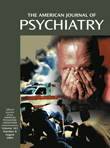Clozapine-Induced Acute Interstitial Nephritis
To the Editor: A patient in our institution developed acute renal failure that was highly suggestive of acute interstitial nephritis after induction of the antipsychotic clozapine. There are few published reports documenting this side effect, the majority occurring in Great Britain, and none has appeared in the psychiatric literature (1). Therefore, we report a case of clozapine-induced acute interstitial nephritis in an effort to prevent further episodes of delayed diagnosis and treatment of this rare complication.
Mr. A was a healthy 33-year-old man with paranoid schizophrenia who was transferred to our institution after the onset of recurrent hallucinations. He was stabilized at another institution with 1500 mg of valproic acid at bedtime, 80 mg b.i.d. of ziprasidone, and 800 mg t.i.d. of gabapentin. His medications were subsequently changed to 500 mg b.i.d. of valproic acid, 800 mg at bedtime of gabapentin and 400 mg in the morning, and 2 mg of risperidone at bedtime. Minimal improvement was noted, and on the third week, 25 mg of clozapine at bedtime was started and titrated to 100 mg. At the initiation of treatment, all of Mr. A’s laboratory blood work had been normal. One week later, his eosinophil count was slightly elevated at 6.1% (absolute count=0.49 10×9/liter). On the second week after the introduction of clozapine, he developed nausea, vomiting, a sore throat, diarrhea, a fever of 104°F, and a positive urinalysis (leukocyte esterase, WBC casts, 2+ protein, 1+ hemoglobin, 10–50 WBCs). Trimethoprim-sulfamethoxazole was started to treat a suspected urinary tract infection, and laboratory samples drawn at that time showed a sodium level of 132 mEq/liter, a BUN level of 87 mg/dl, and a creatinine level of 9.7 mg/dl. Mr. A was diagnosed with acute renal failure and transferred to a tertiary care center.
At that point, all medications were stopped except for valproic acid, and Mr. A was given intravenous hydration. An ultrasound of his kidneys showed bilateral echogenic kidneys without hydronephrosis, moderate renal disease, and glomerular nephritis. Mr. A maintained good urine output throughout his hospital stay. Over 1 week, he was monitored, and his WBC rose from 12.5 to 22.3 (10×9/liter), his eosinophil count rose to 11% (absolute count=2.5 10×9/liter), but his BUN and creatinine levels decreased to 76 mg/dl and 4.1 mg/dl, respectively, signaling at least partial return of renal function. He was discharged after a short hospital stay without further significant treatment.
Most often, acute interstitial nephritis is drug induced and appears soon after initiation of new drugs with the clinical triad of rash, fever, and eosinophilia. While multiple drugs have been implicated as possible etiologies of acute interstitial nephritis, the patient’s previous tolerance of all other medications and the chronological onset of his symptoms after the initiation of clozapine suggest that this case most likely represents clozapine-induced acute interstitial nephritis. As weekly blood draws to detect agranulocytosis are the standard of care for the first 6 months of treatment with clozapine, we suggest that a rising eosinophil count in the setting of recent initiation of clozapine therapy may be a predictor of drug-induced acute interstitial nephritis and should be managed as such.
1. Fraser D, Jibani M: An unexpected and serious complication of treatment with the atypical antipsychotic drug clozapine. Clin Nephrol 2000; 54:78–80Medline, Google Scholar



